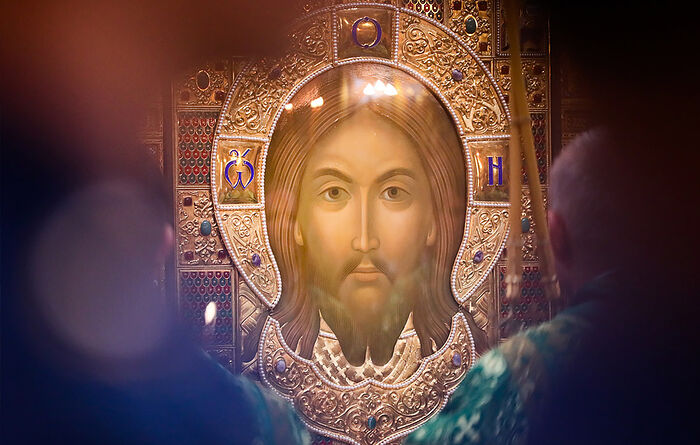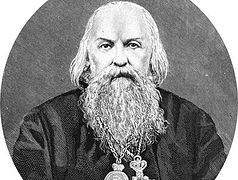The Church continues to commemorate today the preceding feast of the Exaltation of the Life-giving Cross of the Lord. On this Sunday after the Exaltation, we continue to glorify the Lord’s sacrifice and the instrument by which it was accomplished.
Of course, every major feast in the Church year continues for several days. In this the feast of the Cross is not unique, and yet, we can allow the fact of this continuation to remind us and reiterate for us that the Cross is not simply something that we glorify on a few specific days every year—rather, for Orthodox Christians, the Cross is to be our constant companion in this life.
This is because the Cross is not simply the instrument of Christ’s death, but it is, in fact, the Lord’s glory. Throughout the Gospel of John, Christ speaks of the Crucifixion as His glorification of the Father, and His glorification by the Father. The crosses that we wear on our chests and our icons of the Crucifixion often read, “The Lord of Glory.” Of course, we know that the Crucifixion was not the end of the story, but rather, the Lord of Glory entered into death and vanquished it from the inside out, for He is Life.
And all that Christ wrought, He did that He might share His glory with us. This is the beginning, middle, and end of the spiritual life. This is our goal.
In Orthodoxy, we can say that our standard is nothing less than the glory, the perfection of Christ.
The Lord Himself states this plainly: Be ye therefore perfect, even as your Father Which is in Heaven is perfect (Mt. 5:48), and it is the distinction of Orthodoxy that the Church refuses to diminish the perfection of Christ, which therefore means it refuses to diminish the high calling of man. Christ reveals what Adam and Eve were always meant to be.
Though we don’t say that the old Law has simply passed away, we also don’t conceive of the spiritual life as simply a matter of abiding by do’s and don’ts. Rather, the spiritual life is the never-ending pursuit of Divine perfection, revealed to us in the Person of Christ.
The Lord Himself also speaks to this in the Gospel passages we heard proclaimed today. When a lawyer asks Him which is the greatest commandment, He points to that which encapsulates the whole of the Law: Thou shalt love the Lord thy God with all thy heart, and with all thy soul, and with all thy mind. And, He adds, Thou shalt love thy neighbour as thyself. On these two commandments hang all the Law and the prophets (Mt. 22:37, 39-40).
That is, all of the dos and don’ts of the Old Testament, all the prophetic calls, can be neatly summed up in the call to love. And what does it mean to truly love? For God so loved the world, that He gave His only begotten Son, that whosoever believeth in Him should not perish, but have everlasting life (Jn. 3:16). God’s love is seen most vividly on the Cross.
The Almighty Lord over all creation chose to enter into that creation, and to be mocked and scorned by that creation, and finally, to be put to death by that creation. Life itself descended into the earth and entered into death for us. The Father gave us His very Son, and the Son descended as low as Life could descend.
Thus, the love of God, the glory of God, revealed to us on the Cross, means to offer up everything, to hold nothing back.
Again, Christ says: Whosoever will come after Me, let him deny himself, and take up his cross, and follow Me. For whosoever will save his life shall lose it; but whosoever shall lose his life for My sake and the Gospel's, the same shall save it. For what shall it profit a man, if he shall gain the whole world, and lose his own soul? Or what shall a man give in exchange for his soul? (Mk. 8:34-37).
We heard the same today from the Apostle Paul: Always bearing about in the body the dying of the Lord Jesus, that the life also of Jesus might be made manifest in our body (2 Cor. 4:10) And we faithfully bear the dying of the Lord Jesus because God desires to give [us] the light of the knowledge of the glory of God in the face of Jesus Christ (2 Cor. 4:6).
Again, in Orthodoxy, we can say that our standard is nothing less than the glory, the perfection of Christ.
St. Seraphim of Sarov famously said that the aim of the Christian life is the acquisition of the Holy Spirit. St. Gregory Palamas said that beholding the vision of Christ in glory is the true sign of a healthy Christian soul.
But, Christ is merciful, and His Body, the Church, is merciful and meets us where we are. Thus, I think we will not do violence to this saying of St. Gregory if we say that a soul that at least desires to behold the glory of Christ and acquire it for itself is a healthy Christian soul. If we confess that we seek the perfection of God and nothing less, if we remain on this path, rising again when we fall, and picking up our cross again when we drop it, this is a healthy spiritual life.
But of course, the Church does not simply call us to pick up our cross and follow and imitate Christ, but it continually offers us varied and blessed examples of how this plays out in the life of man. The holy Apostle Paul calls us to follow and imitate him, for he follows and imitates Christ (1 Cor. 11:1). We imitate him not because he simply adhered to certain precepts, but because he imitated the self-emptying of Christ. And it is the same with all the saints.
And as we see in the lives of the saints, there are many ways to carry one’s cross. In fact, we can say that part of our cross is simply the struggle to understand what our particular cross is—what bearing the cross is to look like in our lives.
St. Paul gave his life to the blessed work of apostolic preaching throughout the known world, culminating in his blessed martyrdom. If he calls us to imitate him, am I therefore called to lay aside my life as I know it and missionize in a faraway land?
The Church annually places before us the deeply moving life of St. Mary of Egypt in the midst of the Great Fast. Am I therefore called to lay aside my life as I know it and flee into the desert?
Certainly, we are not all called to be missionaries; certainly, we are not all called to desert asceticism. And yet, the Church calls out: “Imitate them. Be inspired by them.”
Of course, in the Church, we understand that we are not called to imitate the saints, or even the Lord Himself, according to their specific deeds or the external circumstances of their lives. Rather, it is their inner deeds, their unending pursuit of the perfection, love, and glory of Christ that we are to appropriate for ourselves.
And we must wrestle with the question of how this plays out in our own lives. We take this question to our priests, to our spiritual fathers, seeking the pastoral voice of the Lord in His ordained ministers on earth. This is part of our cross.
We do not convince ourselves that the saints are lofty exceptions, but rather we recognize them as those who have drawn near to the standard of spiritual living.
The saints are those who sought higher things, higher joys, higher pleasures, which is the aim of the whole of the Church’s ascetic spiritual life. Too often we conceive of asceticism as simply the forceful deprivation of our pleasures in life. We understand our spiritual practices as ends in and of themselves that therefore ultimately lead nowhere. Then, for the sacrifices of the Great Fast, we are rewarded with our bounteous Pascha baskets.
But when we truly begin to embark upon the spiritual life, when we pick up the Lord’s Cross, when we take the example of the saints to heart, then we understand on the deepest level that the reward for our Lenten discipline is, in fact, the worthy communion of the Precious Body and Blood of the Lord. What we sacrificed in earthly pleasure, we gained in spiritual pleasure, because nothing in the Church is an end in and of itself, but is always a means to glory.
For most, this means to glory is the marital and familial life. Of this, St. John Chrysostom says succinctly: “If a man and a woman marry in order to be companions on the journey from earth to Heaven, then their union will bring great joy to themselves and to others.”
And as we sing at every Sunday Matins service, it is through the Cross that joy comes into the world.
Thus, we glorify the Cross because it is Christ’s glory, and it is this glory that we seek, for the Christian standard is nothing less than the glory, the perfection of Christ.





